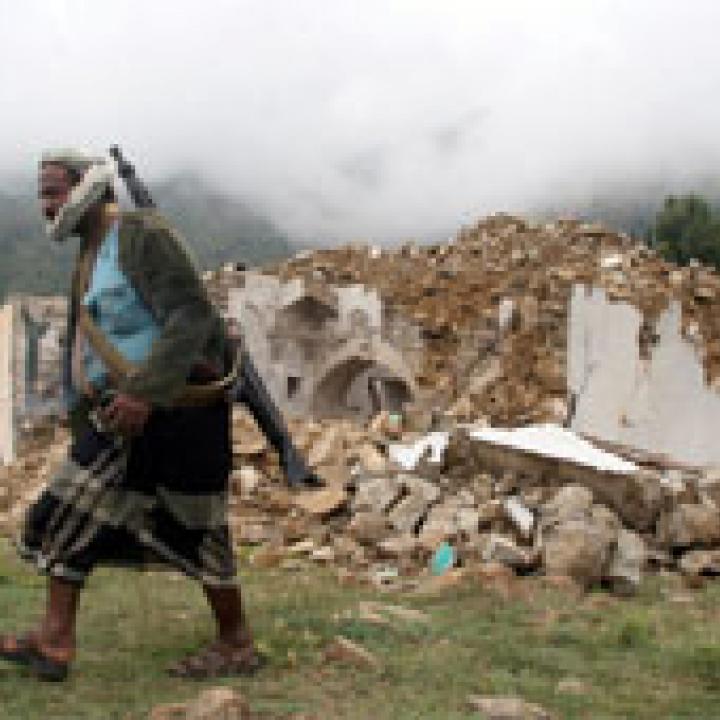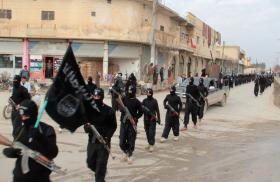
- Policy Analysis
- Articles & Op-Eds
How the War in Yemen Explains the Future of Saudi Arabia

Instead of viewing Yemen as a poor peripheral country of little strategic importance, the Saudis seem to see it as a dagger aimed at their heart, with Iran holding the hilt.
Suffice it to say, this past weekend was a varied and busy one for Saudi Crown Prince Mohammed bin Salman. Between arresting a reported 11 cousins as part of an anti-corruption crackdown, apparently orchestrating the surprise resignation of the Lebanese prime minister, reading (likely with glee) President Donald Trump's tweet expressing hope that the national oil company, Aramco, would sell its shares on the New York Stock Exchange, MbS, as the Saudi heir apparent to his father King Salman is known, took a series of breathtaking steps towards consolidating his power. On top of that, the headline-grabbing detention of flamboyant billionaire tycoon Prince Alwaleed bin Talal guaranteed maximum coverage, putting the kingdom at the center of the world for a few news cycles.
If you're searching for the real story here, look to Iran. On Saturday, Riyadh's international airport was targeted by what was almost certainly an Iranian modified missile from northern Yemen. This area is under the control of the Houthi rebels, who in 2015 forced President Abed Rabbo Mansour Hadi to flee, sparking a civil war; since then, a brutal Saudi-led coalition has sought to restore Hadi to power. That campaign has, in turn, made it the target of 78 missile attacks from Yemen. Most have barely merited a news story. In March 2015, King Salman complained to visiting then-Secretary of State John Kerry that he feared Scud missile attacks on Mecca, which lies 350 miles north of the Yemeni border. Riyadh is more than 700 miles from Yemen. That's a big difference, and suggests significant, swift technical progress.
For MbS and the Saudi leadership, attacks from Yemen represent a phobia which the Houthis and their Iranian backers delight in tweaking. On Monday, the Saudi English-language newspaper Arab News carried the headline that the missile attack was "an act of war" by Iran. "The kingdom reserves the right to respond in a timely manner to the hostile actions of the Iranian regime…We will not allow any infringement of our national security," Saudi Foreign Minister Adel al Jubeir said. The piece also quoted the Saudi-led Coalition Forces Command calling the attack "a blatant act of military aggression by the Iranian regime."
Tactically, the Saudis and their allies in the United Arab Emirates are bogged down in their mission to reinstate Hadi. Strategically, the missile attack suggests the alliance may be losing -- a trend MbS is eager to reverse. Those who have met him say he wants to become more assertive on Iran and its proxies. Further missile attacks like the last one may prompt foreign airlines to stop flying to Riyadh. Such danger does not comport with MbS's new "brand" of a modern, shiny kingdom that has embraced moderate Islam, a vision he unveiled at a major foreign-investors conference just weeks ago.
The Saudi-Iranian power struggle predates MbS -- the latest iteration dates back to the 1979 Islamic revolution. Saudi Arabia views Iran as a historical and ethnic foe, a Shia rival challenging Saudi leadership of the Sunni-Muslim world, and a revolutionary challenger to the regional status quo. Iran's long-term goal is to upset a status quo effectively guaranteed by the United States. Its short-term goal is to take advantage of the consequences of the Iraq war and the Arab Spring to spread its influence and reach out to Shia communities across the region. Baghdad, Damascus, Sanaa, and Beirut now reside in the Iranian camp. Saudi Arabia leads the conservative Arab states, although the steady rise of MbS means that these populations are now being offered an up-to-date (although non-democratic) future. For the 32-year-old MbS, dealing with Iran is as important as transforming the Saudi economy and, under the cover of an anti-corruption campaign, sorting out royal rivalries.
For Iran, Yemen, under the declining rule of Ali Abdullah Saleh, was a target of opportunity. Supporting the Houthi tribes by providing organizational assistance and funds was a mere stratagem. Saleh's rule collapsed but he forged an alliance with the Houthis against President Hadi, who is under house arrest in Saudi Arabia. Despite the Saudi air force's best efforts, it has failed to dislodge the Houthis. The UAE's forces have been more successful in the south of the country, around the port city of Aden. But there it is challenged by al-Qaeda types who have turned the Yemeni hinterlands into their sanctuary.
Iran's success in supporting its Houthi allies in Yemen appears to be a consequence of niche involvement, a small bet which has paid off. Several months ago, I asked a Saudi general visiting Washington how many Iranians were in Yemen -- I expected a guess of thousands or perhaps hundreds. His response to what I assumed was an obvious question surprised me: "I don't know." The prevailing wisdom, based on responses to my pestering of officials in Washington, is that the figure is in the scores. Small teams come in from Iran to train or operate particular weapon systems and then leave, according to these officials. Hence, the missiles fired from the coast at U.S. warships in the Red Sea last year, and the drone boat attack on a Saudi frigate in January.
Missile experts credit Iran for the extended range of Yemen's residual arsenal of Scud missiles. Officials have told me that Iran has probably sent larger fuel tanks and sections of fuselage to Yemen. Attempts to smuggle in entire missiles would have been noticed and, one would have hoped, prohibited by the United States. Tracking trucks loaded with containers offloaded in buildings or tunnels, on the other hand, presents headaches for intelligence officials. Missile parts are also much easier to move in quietly. (Despite the blockade and shortages of food and humanitarian aid in the Houthi-controlled area, The Economist reported in July that Baskin-Robbins ice cream was still reaching Sanaa via refrigerated trucks driven overland from Oman.) The challenge is to weld the extensions into existing missiles. Iran has likely solved the technical difficulties relating to stability in flight during its recent missile tests on its own territory.
Saudi Arabia's response to Saturday's missile was rapid. Rather dramatically, it announced the next day that it would shut all land, sea, and air borders with Yemen. Riyadh also posted a list of photos and names of 40 Houthis wanted for what it called "terrorist crimes." Rewards were offered as well: $30 million for Abdulmalik Bader al Houthi, the Houthi leader, $20 million for his ten top lieutenants, $10 million for the next echelon of operatives, and so on. One wonders why it has taken Riyadh so long to offer such inducements: Yemen is known as a place where even loyalty has a price.
Instead of viewing Yemen as a poor peripheral country of little importance, the princes of the House of Saud seem to see it as a dagger aimed at their heart -- MbS's grandfather Ibn Saud supposedly warned of the threat of Yemen on his death bed. As long as the regional proxy war with Iran continues, Yemen will remain a key theater for that war, and a vital piece of MbS' regional ambitions.
Simon Henderson is the Baker Fellow and director of the Gulf and Energy Policy Program at The Washington Institute.



